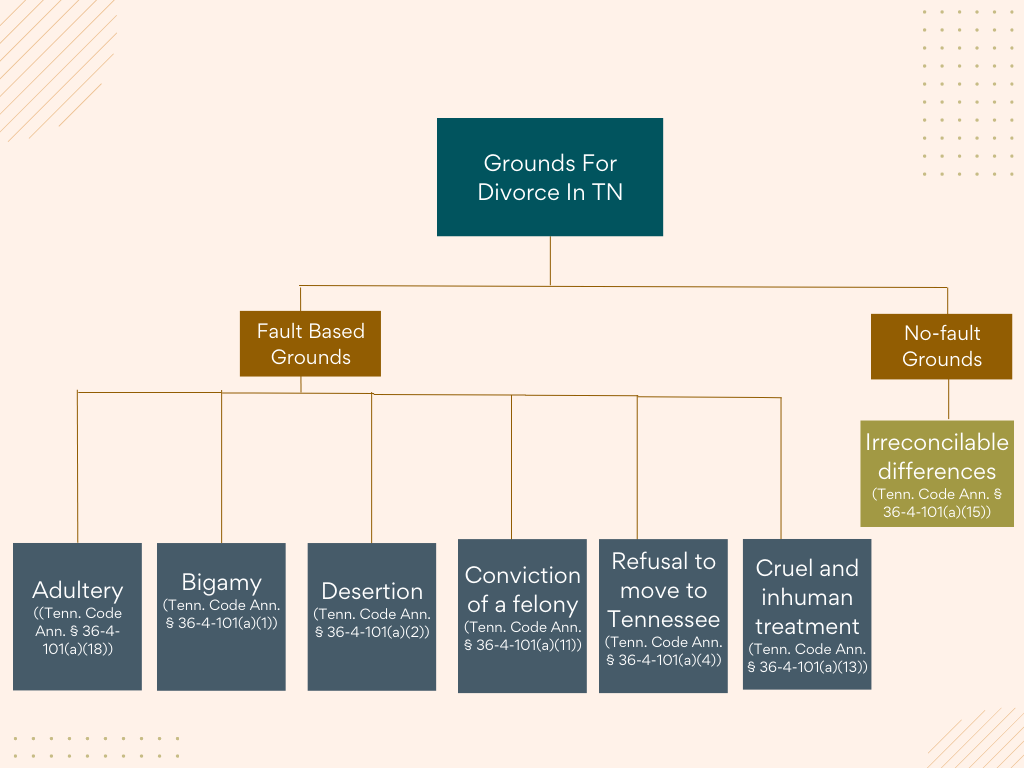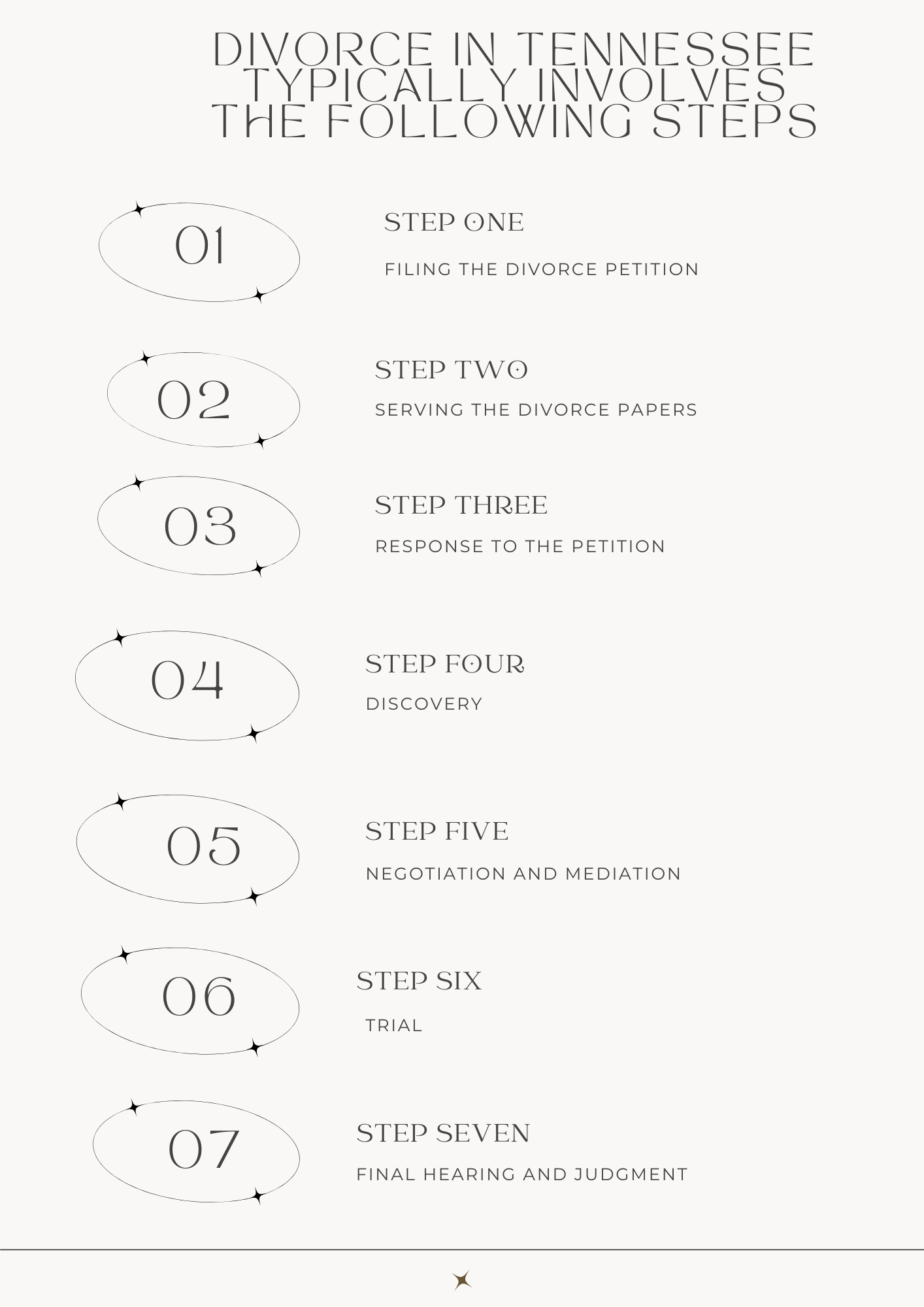
Divorce is a complex and emotional process, and understanding the laws and procedures related to divorce in Tennessee can be overwhelming. If you are considering a divorce in Tennessee, it is essential to have a clear understanding of your legal rights and obligations. This blog post aims to answer some of the most frequently asked questions about divorce in Tennessee, including the grounds for divorce, property division, child custody, alimony, and more. Whether you are just starting to consider divorce or are already in the midst of the process, this post can help you navigate the legal complexities of divorce in Tennessee. So, read on to learn more about divorce in Tennessee.
In Tennessee, there are two types of grounds for divorce: fault-based and no-fault. Fault-based grounds require that one spouse prove that the other spouse committed wrongdoing or misconduct, while no-fault grounds do not require proof of fault.

The fault-based grounds for divorce in Tennessee include:
No-fault grounds for divorce in Tennessee include:
It is important to note that proving fault in a divorce can be difficult, time-consuming, and expensive. Therefore, many couples pursue a no-fault divorce, as it can be quicker and less contentious. Ultimately, the grounds for divorce in Tennessee will depend on the specific circumstances of each case, and it is recommended that you consult with a qualified divorce attorney to determine the best course of action for your situation.
To file for divorce in Tennessee, at least one spouse must have been a state resident for at least six months before filing. This means that either the petitioner or the respondent must have lived in Tennessee for at least six months immediately before filing the divorce petition.
Additionally, there are minor children involved in the divorce. In that case, the case must be filed in the county where the children reside or where the petitioner resides if the children do not live in Tennessee.
The legal section for the residency requirements for divorce in Tennessee can be found in Tennessee Code Annotated, section 36-4-104(a)(2), which states: "A complaint for divorce may be filed in any county where either party resides at the time of the filing, or if the defendant is a nonresident of Tennessee, in the county where the plaintiff resides, or in the county where the parties last lived together, at the option of the plaintiff."
Getting a divorce in Tennessee typically involves the following steps:

It's important to note that the divorce process in Tennessee can be complex and time-consuming, and specific timelines and requirements may vary depending on the circumstances of each case. For example, if minor children are involved, the court may require the parties to attend a parenting class. Additionally, there may be specific waiting periods that must be observed before a divorce can be granted. It is recommended that anyone considering a divorce in Tennessee consult with an experienced family law attorney to understand their legal rights and obligations and to ensure that the divorce process is as smooth and efficient as possible.
When a couple divorces in Tennessee, the court is responsible for dividing the marital property. Marital property is any property acquired by either spouse during the marriage, except for the property received by gift or inheritance.

Tennessee is an equitable distribution state, meaning that the court will divide marital property fairly and equitably but not equally. This means that the court will consider a variety of factors when making property division decisions, including the following:
When dividing marital property, the court will first classify the property as either marital or separate. Separate property is not subject to division in a divorce. Marital property, on the other hand, will be divided between spouses.
In Tennessee, marital property is typically divided on an equitable basis, taking into account the factors listed above. The court may award each spouse a portion of the marital property or order the sale of the property and divide the proceeds between the spouses.
The legal section for property division in a Tennessee divorce can be found in Tennessee Code Annotated, section 36-4-121, which states that "In all cases in which an order for the payment of alimony is made or a divorce is granted, the court may make a such equitable division of the marital property as may appear just and reasonable.
When parents divorce in Tennessee, the court makes decisions regarding child custody. The court will make a custody determination in the best interests of the child or children involved.
There are two types of custody arrangements in Tennessee: physical and legal. Physical custody refers to where the child lives. In contrast, legal custody refers to the ability to make significant decisions about the child's upbringing, such as education, healthcare, and religion.

Physical custody may be awarded to one parent (sole custody) or both (joint custody). In joint custody cases, the child will typically spend time living with both parents. Legal custody may also be awarded to one parent (sole legal custody) or both parents (joint legal custody). If one parent is awarded sole legal custody, that parent will have the exclusive right to make major decisions about the child's upbringing.
When making a custody determination, the court will consider a variety of factors, including the following:
The legal section for child custody in a Tennessee divorce can be found in Tennessee Code Annotated, section 36-6-106, which states, "The paramount goal of the court in custody matters is to determine what is in the best interests of the child." Additionally, Tennessee Code Annotated, section 36-6-404, sets forth a list of factors the court must consider when making a custody determination, including those above.
For example, in the case of Jones v. Jones, 123 S.W.3d 685 (Tenn. Ct. App. 2003), the court considered the preferences of the children, the ability of each parent to provide for the children's physical and emotional needs, and the willingness of each parent to facilitate a relationship between the children and the other parent, among other factors, in making a custody determination.
When couples divorce in Tennessee, the court may order one spouse to pay alimony to the other spouse. Alimony is financial support paid by one spouse to the other and is designed to provide the recipient spouse with the means to maintain a standard of living similar to that enjoyed during the marriage.

Several types of alimony may be awarded in Tennessee, including rehabilitative, transitional, and periodic alimony. Rehabilitative alimony is designed to provide support while the recipient spouse obtains education or training to become self-sufficient. Transitional alimony is designed to provide support while the recipient spouse adjusts to the financial changes associated with the divorce. Periodic alimony is ongoing support paid regularly.
When awarding alimony, the court will consider a variety of factors, including the following:
It's important to note that there are limitations on the duration and amount of alimony that may be awarded in Tennessee. For example, rehabilitative and transitional alimony is typically awarded for a limited duration. In contrast, periodic alimony may be granted for a longer period of time but is usually subject to review by the court.
The legal section for alimony in a Tennessee divorce can be found in Tennessee Code Annotated, section 36-5-121, which states that "The court may grant alimony to either party, payable either in gross or in installments, as the court may deem just and equitable, after considering all relevant factors." Additionally, Tennessee Code Annotated, section 36-5-121(f), sets forth factors the court must consider when awarding alimony, including those listed above.
For example, in the case of McReynolds v. McReynolds, 2021 Tenn. App. LEXIS 64, the court considered the length of the marriage, the age and health of the parties, the earning capacity of each party, and the standard of living enjoyed during the marriage, among other factors, when awarding alimony to the wife.
The timeline for a divorce in Tennessee can vary depending on a number of factors, including the complexity of the case, whether the divorce is contested or uncontested, and the backlog of cases in the local court system. Generally, an uncontested divorce can be completed more quickly than a contested one.
In Tennessee, the divorce process typically begins with one spouse filing a Complaint for Divorce in the appropriate county court. The other spouse is then served with a copy of the Complaint and has the opportunity to file a response. If the divorce is uncontested and the parties can reach a settlement agreement, the divorce can usually be finalized within a few months.
However, if the divorce is contested and the parties cannot agree on issues such as property division, alimony, or child custody, the process can take significantly longer. A contested divorce may involve a number of court appearances, hearings, and negotiations, which can stretch the timeline to several months or even years.
There are a few options for expediting the divorce process in Tennessee. For example, in some cases, the parties may be able to reach a settlement agreement through mediation or collaborative law, which can help to avoid a lengthy court battle. Additionally, Tennessee law allows for expedited divorce proceedings in domestic violence or other emergencies.
It's important to note that every divorce is unique, and the timeline for a divorce in Tennessee can vary depending on the case's specific circumstances. It is recommended that anyone going through a divorce in Tennessee consult with an experienced family law attorney to understand their legal rights and options and get an estimate of how long their divorce may take to complete.
In Tennessee, an uncontested divorce is one in which both spouses agree on all of the issues related to the divorce, including property division, alimony, child custody, and child support. An uncontested divorce can be simpler and faster than a contested divorce and may also be less expensive.
For an uncontested divorce in Tennessee, the following requirements must be met:
To file for an uncontested divorce in Tennessee, one spouse must file a Complaint for Divorce with the court, and the other spouse must file an Answer and Waiver of Service, indicating that they agree to the divorce terms. If all requirements are met, the court will grant the divorce without a hearing.
The legal section for an uncontested divorce in Tennessee can be found in Tennessee Code Annotated, section 36-4-104, which states that "An agreed divorce may be granted upon motion of both parties to the marriage, or upon the motion of one (1) of them, if the moving party has served written notice on the other party of the filing of the Complaint or petition for divorce and the other party has failed to answer or otherwise respond within thirty (30) days after the notice was given.
| Request for divorce | This is the initial legal document that one spouse files with the court to begin the divorce process. | Download for free. |
| Spouse's personal information | This form provides basic information about each spouse, such as their name, address, and contact information. | Download for free. |
| Request to postpone filing fees | This form is used to request a waiver of the court filing fees if one spouse cannot afford to pay them. | Download for free. |
| Health Insurance notice of divorcing spouses | This form is used to notify health insurance providers that a divorce is pending and to request that they continue coverage for the non-employee spouse. | Download for free. |
| Divorce Agreement | This is a written agreement between the spouses that addresses issues such as property division, alimony, and any other matters related to the divorce. | Download for free. |
| Final Decree of Divorce | This is the court's final order granting the divorce and setting forth the terms of the divorce. | Download for free. |
| Court order for divorcing spouses | This is a document signed by the judge and entered into the court record, confirming that the divorce has been granted and setting forth the terms of the divorce. | Download for free. |
| Divorce Certificate | This is a document issued by the court that serves as proof of the divorce. | Download for free. |
| Notice of hearing to approve irreconcilable differences divorce | This is a notice of the court hearing where the judge will review the divorce agreement and enter the final decree of divorce. | Download for free. |
| Request for divorce | This is the initial legal document that one spouse files with the court to begin the divorce process. | Download for free. |
| Spouse's personal information | This form provides basic information about each spouse, such as their name, address, and contact information. | Download for free. |
| Title IV-D Information Form | This form is only needed if one or both parents receive benefits from the State of Tennessee or child support. | Download for free. |
| Request to postpone filing fees | This form is used to request a waiver of the court filing fees if one spouse cannot afford to pay them. | Download for free. |
| Health Insurance notice of divorcing spouses | This form is used to notify health insurance providers that a divorce is pending and to request that they continue coverage for the non-employee spouse. | Download for free. |
| Divorce Agreement | This is a written agreement between the spouses that addresses issues such as property division, alimony, and any other matters related to the divorce. | Download for free. |
| Child support worksheet | This is a form used to calculate the amount of child support that one parent may be required to pay to the other. | Download for free. |
| Parenting plan | This is a written agreement between the parents that addresses issues related to the care and custody of any minor children, including visitation schedules, decision-making responsibilities, and child support. | Download for free. |
| Final Decree of Divorce | This is the court's final order granting the divorce and setting forth the terms of the divorce. | Download for free. |
| Court order for divorcing spouses | This is a document signed by the judge and entered into the court record, confirming that the divorce has been granted and setting forth the terms of the divorce. | Download for free. |
| Divorce Certificate | This is a document issued by the court that serves as proof of the divorce. | Download for free. |
| Notice of hearing to approve irreconcilable differences divorce | This is a notice of the court hearing where the judge will review the divorce agreement and enter the final decree of divorce. | Download for free. |
The filing fee for filing for divorce in Tennessee can vary depending on the county in which the divorce is filed. In most counties, the filing fee is between $100 and $400. However, there may be additional fees for other services, such as serving papers on the other spouse, obtaining certified copies of documents, or attending a parenting class.
It's important to note that if a spouse cannot afford to pay the filing fee, they may be able to request a waiver of the fee by filing a Request to Postpone Filing Fees form with the court. The court will review the request and may grant a waiver if the spouse can demonstrate that they cannot pay the fee.
Yes, you can get a divorce in Tennessee even if you were married in another state. However, you must meet Tennessee's residency requirements, which require that you or your spouse have lived in the state for at least six months prior to filing for divorce.
In Tennessee, you can serve your spouse with divorce papers by personal delivery, certified mail, or hiring a process server to deliver the papers. The specific requirements for serving divorce papers in Tennessee can vary depending on the circumstances of the case.
A parenting plan is a written agreement between the parents that addresses issues related to the care and custody of their children after a divorce. A parenting plan is required in all Tennessee divorce cases involving minor children. The parenting plan outlines each parent's rights and responsibilities regarding the children, including visitation schedules, decision-making responsibilities, and child support.
In a contested divorce, the spouses cannot agree on the terms and must go to court to have a judge decide the issues. In an uncontested divorce, the spouses can agree on all of the issues related to the divorce, such as property division, alimony, and child custody and support, without needing court intervention.
In Tennessee, the court will consider several factors when determining whether to award alimony to a spouse, including the length of the marriage, the earning capacity and financial needs of each spouse, and the standard of living established during the marriage. The court will also consider any fault or wrongdoing by either spouse that contributed to the divorce.
If you and your spouse cannot agree on dividing your property in a Tennessee divorce, the court will decide for you. The court will consider factors such as the length of the marriage, the contributions of each spouse to the acquisition of the property, and the property's value when making its decision.
In Tennessee, you may qualify for a no-fault divorce if you and your spouse have been living separately and apart for at least two years and no minor children are involved. You may also qualify for a no-fault divorce if you and your spouse agree that the marriage is irretrievably broken and you have entered into a written agreement addressing all issues related to the divorce.
Tennessee has a mandatory waiting period of 60 days after filing for divorce before the court can grant the divorce.
Yes, in Tennessee, child custody and support orders can be modified if circumstances have changed significantly since the original order was issued. The party seeking the modification must file a motion with the court and demonstrate that there has been a substantial change in circumstances that justifies the modification.
To protect your rights and interests in a Tennessee divorce, it is recommended that you hire an experienced family law attorney who can provide legal guidance and representation throughout the process. It is also important to keep thorough and accurate records of all financial and other relevant information related to the divorce.
If you suspect your spouse is hiding assets or income during the divorce process, you can take legal action to uncover and address the issue. This may involve hiring a forensic accountant or other financial experts to assist in the investigation. Your attorney can also take steps to request financial information and documents through the legal process.
Divorce can have significant tax implications in Tennessee, particularly regarding property division and spousal support. You should consult with a tax professional or attorney to understand the potential tax consequences of your divorce and how to minimize your tax liability.
A mediator is a neutral third party who assists the spouses in reaching a mutually agreeable resolution to the issues in their divorce. The mediator does not make decisions for the spouses but helps facilitate communication and negotiation between them.
If you need temporary support or custody orders during the divorce process, you can file a motion with the court requesting such orders. The court will schedule a hearing to consider your request and may issue temporary orders until the final divorce decree is entered.
If your spouse does not comply with court orders in a Tennessee divorce, you can take legal action to enforce the orders. This may involve filing a motion for contempt or other legal remedies. You should consult with an attorney to understand your options and rights in such situations.
In Tennessee, marital debt is subject to equitable division in a divorce. This means that the court will consider factors such as the property's nature and value, the marriage's length, and the economic circumstances of each spouse when deciding how to divide the debt.
Marital property in Tennessee is generally considered to be any property acquired by either spouse during the marriage, while separate property is property owned by one spouse before the marriage and any property acquired by gift or inheritance during the marriage. Marital property is subject to equitable division in a divorce, while separate property generally remains with the owner.
Retirement accounts and pensions are typically considered marital property in Tennessee if acquired during the marriage. The court will consider several factors when dividing retirement accounts and pensions, including the length of the marriage, each spouse's contribution to the account, and the tax consequences of the division.
You can file for divorce in Tennessee even if your spouse is in the military and stationed out of state or overseas. However, special rules and requirements may apply in such cases, and it is recommended that you speak with an attorney who is familiar with military divorce issues.
In Tennessee, child support is determined based on a formula that considers each parent's income, the number of children, and other factors such as health insurance costs and childcare expenses. The court may also consider other relevant factors in making its determination.
Yes, you can represent yourself in a Tennessee divorce. Still, it is generally recommended that you seek the advice and guidance of an experienced family law attorney to protect your rights and interests.
One way to minimize the cost of a Tennessee divorce is to seek an uncontested divorce if possible, as this can be less expensive and time-consuming than a contested divorce. You should also work with an attorney who offers flat fees or other affordable billing arrangements.
If your spouse files for divorce in another state, you may be required to participate in the divorce proceedings in that state. However, you may also have the option to contest jurisdiction or transfer the case to Tennessee.
In order to file for divorce in Tennessee, you or your spouse must have been a state resident for at least six months before filing.
Yes, you may be able to change your child's last name after a Tennessee divorce if certain conditions are met. You must petition the court to demonstrate that the name change is in the child's best interests.
You can change your name or get your maiden name back as part of your Tennessee divorce proceedings. You can include a request for a name change in your divorce petition, and if the court approves your request, your name can be legally changed as part of the divorce decree. However, it's important to note that changing your name may have implications for other legal documents and records, such as your driver's license, social security card, and bank accounts. It's recommended that you speak with an attorney and/or a name change professional to understand the process and requirements for changing your name in Tennessee.
If you cannot afford the filing fees, you may request a fee waiver or seek assistance from a legal aid organization. It's recommended that you speak with an attorney or a legal aid organization to understand your options for obtaining affordable legal help in your Tennessee divorce case.
Yes, you can file for divorce in Tennessee even if you are unable to locate your spouse, but you will need to follow specific legal procedures. If you have made a good faith effort to locate your spouse, but have been unable to do so, you can ask the court for permission to serve notice of the divorce proceedings by publication in a local newspaper. You will need to provide evidence to the court that you have made a diligent effort to locate your spouse, such as certified mail, private investigator reports, or affidavits from friends and family members. If the court approves your request for service by publication, you will need to publish notice of the divorce proceedings in a newspaper in the county where your spouse was last known to reside. After the notice has been published for a certain period of time, you can proceed with the divorce proceedings.


All state Approved Forms
Help Starting Over
Marriage Settelment Agreement
Simple Divorce Interview
Designed for Court Acceptance
Forms Completed Online
GetDivorcePapers.Com is an online service that specializes in helping people get divorce papers in their own state.
However, this site does not provide legal advice and use of this site is not a substitute for hiring an attorney licensed to practice in your state.
© 2026 GET DIVORCE PAPERS LIMITED & S S SOLUTIONS LLC
USA - 501 Silverside Rd 105, Wilmington, Delaware 19809
Disclaimer: Your purchase includes 30 days of access to our platform and support services. After the initial 30 days, your subscription will automatically renew each month at $49.99. You can cancel anytime by visiting the My Account section.
